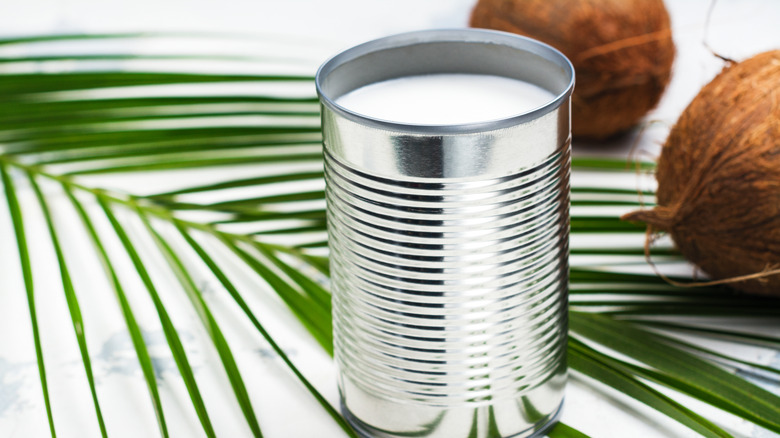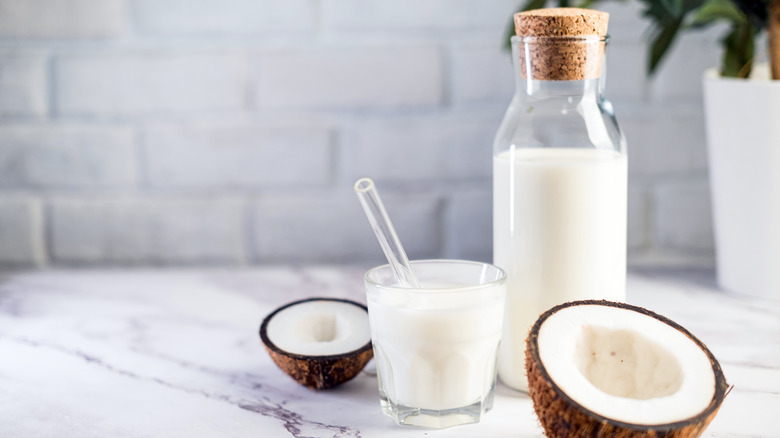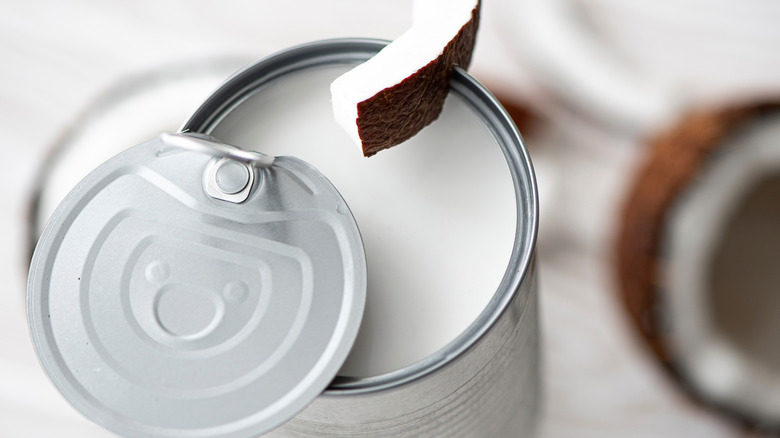How To Tell When Canned Coconut Milk Has Gone Bad
Whether you're a curry connoisseur or you just prefer using non-dairy milk alternatives, keeping a few cans of coconut milk on hand will ensure you can always add some creaminess to your dishes. But, even though the canned variety may be shelf-stable, it won't last forever. So, before you open a can to make Swiss chard coconut curry, verify it's unspoiled first with some easy tips.
The appearance of the canned coconut milk is a good indicator of its quality. Coconut milk should be a creamy white color when it's fresh. As the beverage degrades, its hue may lose some of that vibrancy, and it'll shift to a darker or more muted gray color. And, of course, any visible mold or bulges in the can means the entire thing is likely contaminated and should be tossed in the trash.
If you're met with a sour or foul smell when the can is cracked open, that's also a clear indicator it should be disposed of; rather, good coconut milk should smell lightly sweet and fruity — any unpleasantness is a sign of spoilage. But, when it's good and fresh, the beverage can add some creaminess to soups and fruit smoothies, or be transformed into whipped cream as a serious dessert game changer.
Check for other quality indicators
If your canned coconut milk passes the visual and smell tests, you can also give it a little taste test to determine its quality. Normally, coconut milk will taste pretty mild, and of course, like coconut. If it tastes sour, toss it in the trash. Ingesting even a small amount of spoiled coconut milk could lead to digestive issues, so it's best to sip lightly when testing.
Although chunks may be an indication that dairy milk has gone sour, a little texture may not be a bad sign when it comes to this dairy-free alternative. Canned coconut milk can separate if left to rest for a while, creating a fatty top layer with water underneath, but this is totally normal.
As long as the milk passes other quality inspections, just shake or stir its contents together again to smooth things out. However, that doesn't mean that all textures are safe. If that lumpy texture persists, or if the milk appears slimy, those may be signs that bacteria has begun growing in the can.
Proper storage keeps coconut milk fresh
Proper storage is essential for ensuring cans of coconut milk don't go bad prematurely. Unopened cans should always be kept at room temperature and in dark areas, like kitchen cabinets or pantries. This protects them from temperature fluctuations, which could speed up spoilage.
Once the can has been opened, however, the liquid should be kept in the fridge. The cool temperatures will keep it fresh for up to five days. You'll also want to pour any extra out of the can and into an airtight container to preserve the milk's quality.
You can even freeze coconut milk, though it could become a little more grainy and less flavorful over time. It will need to be removed from the can and poured into a freezer-safe resealable bag or storage container. For smaller portions, it can even be poured into an empty ice cube tray. Defrost in the fridge overnight — about eight to 10 hours — then added into your recipes as usual.



